Why apply to the Nazarbayev University Graduate School of Public Policy (NU GSPP), and what is the “Singapore component”
09.09.2022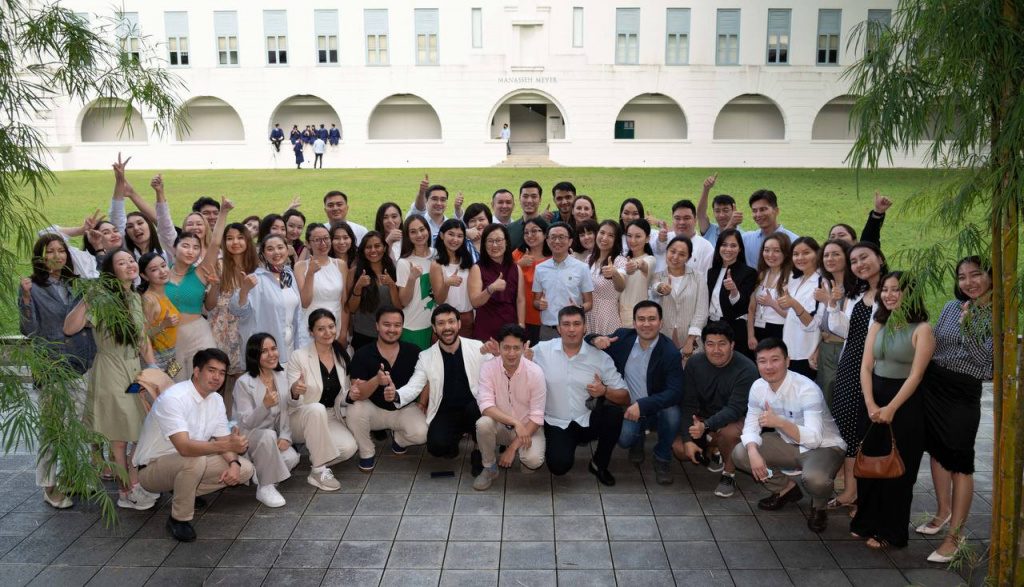
WE Project: Every week we talk about opportunities in education. Today we decided to share information about Nazarbayev University Graduate School of Public Policy (NU GSPP).
The School offers Ph.D. in Public Policy and two Master’s programs: the Master in Public Policy (MPP) and the Master in Public Administration (MPA). In 2019, the NU GSPP Master’s programs received a seven-year accreditation from the European Public Administration Accreditation Association (EAPAA), which guarantees the European standard for the quality of education. NU GSPP is the only educational organization in Central Asia that is currently accredited with EAPAA.
Most students study at NU GSPP on a state grant, and the MPA program allows them to combine work with study. This program is ideal for civil servants and employees of the public, quasi-public, and private sectors who speak English and want to deepen their knowledge in public policy and administration.
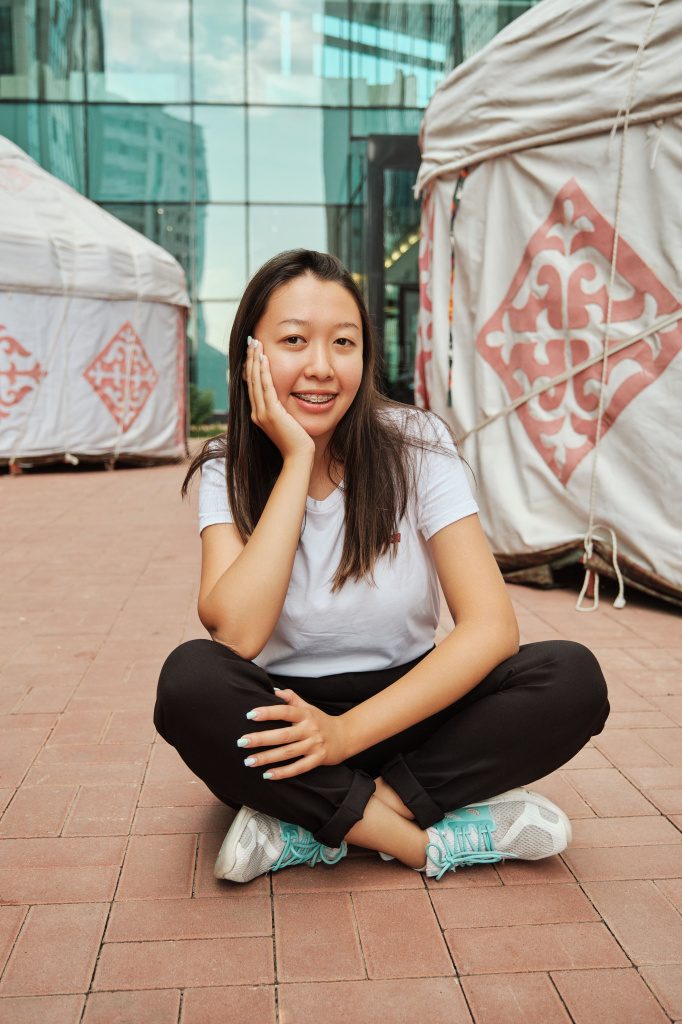 Yenlik Alimkhan, 24 years old, MPP student
Yenlik Alimkhan, 24 years old, MPP student
About choosing a university
I graduated with a bachelor’s degree from Turan University in Almaty. I have studied International Relations in Central Asia and China. I see my career in politics and dream of working in the UN. That’s why I decided to continue my studies in this direction.
I believe that when you study politics and policy, you should learn it in your own country. I chose Nazarbayev University, the best university in Kazakhstan that equips one with both hard and soft skills. NU has excellent facilities that include a swimming pool, gym, and sports sections.
I chose the Master’s program at NU GSPP because the subjects taught here are very relevant. I am especially interested in Data Analytics and want to develop in this direction in the future. The opportunity to visit Singapore through the Singapore Component to understand its development journey and the application of the lessons learnt to Kazakhstan was another major attraction.”
About admission
The admission process has two stages:
– submission of documents: all documents are submitted online; beyond the ID and diplomas, the applicant has to submit a letter of recommendation, motivation letter, language test results, etc.
– interview during which you must present yourself in the best way: the commission members ask various questions regarding your interests, previous studies and work experience.
It is essential to be interested in what you are studying. When preparing for an interview, I recommend looking through the School’s website and becoming acquainted with the subjects within the Master’s program: statistics, public policy, political science, etc. You should also be aware of current events in the world and Kazakhstan’s political life.
About Singapore
I liked the format of the training. Our activities were divided into two parts: lectures/discussions and learning journeys. Learning journeys meant short trips around the city for a deeper study of the topic. In the afternoon, we visited various institutions in Singapore. It was fantastic to listen to the lectures and then go and see it all with my own eyes.
I especially liked the topic about the transport system of Singapore. In Singapore 90% of the population uses public transport. If a person wants to own and drive a car, he/she must bid to purchase a certificate worth about SGD 80,000. In this way, the government controls the number of vehicles in the city.
People of different nationalities live in Singapore. There are areas in the city where they live compactly. When you visit Singapore, you feel you have seen several different countries. The public information is presented in four languages there.
About the program opportunities
MPP students study full-time, and MPA students can combine study with work because the classes are in the evenings and on Saturdays. As an MPP student I am not currently working. However, it is possible to find a part-time job. Now, I am involved in a local government project as an intern.
Understanding in which direction you want to develop and where you see yourself after graduation is crucial. Several of our fellow students have joined Student Government NU. Most of us intend to work in the public sector. Some do internships in state organizations and want to stay there.
I recommend the Master’s program at NU GSPP. Although before applying, be sure to read the rules for admission and the subjects that you will study.
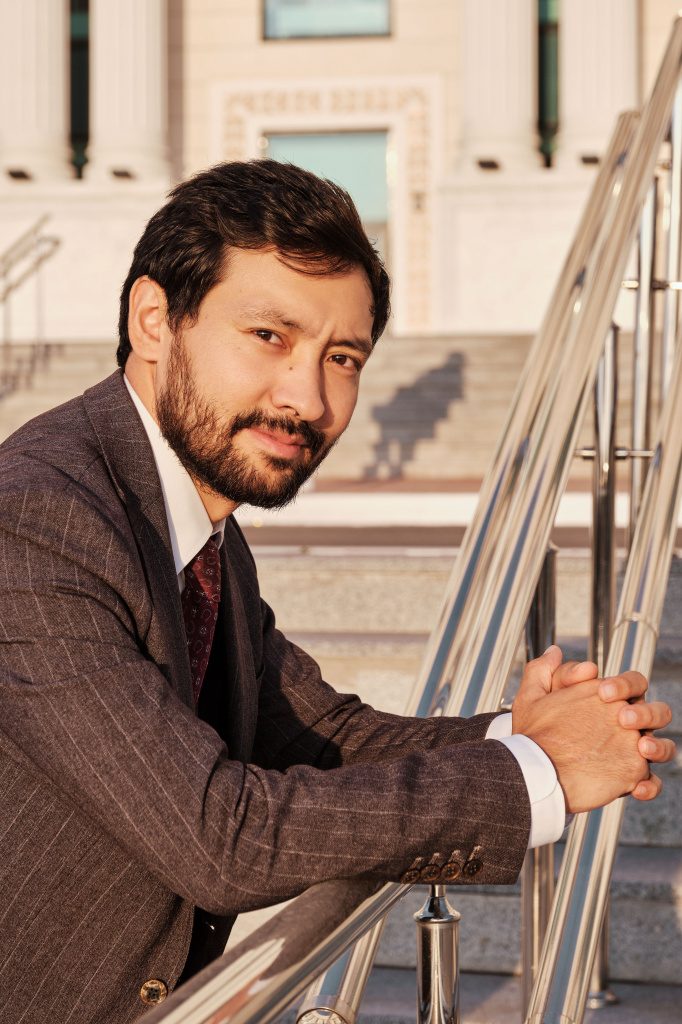 Akzhol Urazalin, 29 years old, civil servant and MPA student
Akzhol Urazalin, 29 years old, civil servant and MPA student
I work in the Department for the Protection of Property Rights of the Ministry of Justice of the Republic of Kazakhstan. I have a Bachelor of Laws degree from KIMEP University and Master of Public International Law from Leiden University, the Netherlands.
About choosing a university
I was looking for the opportunity to gain additional knowledge while working. I have been considering Nazarbayev University for a long time by tracking its programs, so I applied there after careful research.
I work and live in Nur-Sultan, and I chose the university in the capital too. NU attracted me by the number of foreign universities which it cooperates with. It was also vital for me to get an education in English.
I started my Master’s program to deepen my knowledge in public administration. The MPA program gave me that opportunity.
About admission
There were two stages in admission. The first stage consisted of writing three essays: one motivational and two on topical issues of state policy. The second stage is an interview with the faculty members. They asked many questions about my motivation and knowledge.
The admission procedure is the most important. You must carefully study the deadlines for submitting documents, be prepared, and not leave everything to the last moment. In this regard, NU does a great job describing all the admission stages and organizing field meetings with applicants.
If something doesn’t work, you should never give up. You must try again and again. In my case, there were moments when I was forced to miss an interview due to urgent business at work. As a result, I enrolled in NU after trying three times. I gained a state grant and received a stipend while learning. But you need to study to keep the stipend. There is a certain threshold of GPA points below which the scholarship is not paid.
About MPA
Combining work and study is not easy. Nevertheless, I would like to thank my leadership for the opportunity to study. In my office, the policy encourages the acquisition of new knowledge, but at the same time, I was warned that study should not interfere with productivity at work. And in this regard, no one makes concessions if you are studying. I had to decrease my sleeping time. The educational process assumes that I must read and learn in my free time.
About Singapore
The Singapore component is the most memorable part of the program. This year marks ten years since the NU Graduate School of Public Policy and the Lee Kuan Yew School of Public Policy in Singapore signed a strategic cooperation agreement.
In the morning, we had lectures and discussions on campus at the Lee Kuan Yew School of Public Policy. In the afternoon, we had traveling lectures around the city. We saw how Singapore’s state policy works in practice. For example, we visited the NEWater plant and saw how Singapore’s water supply system works. There is an acute water shortage in the country, and there are four methods of obtaining and using water. The first is to collect rainwater. The second is to import water from Malaysia. The third is to convert salt water into fresh water. Fourth, they process wastewater into drinkable water at the plant.
When we talk about Singapore, we mean a good state structure and effective government work. For example, there are no electric poles in the city because everything is underground. Any technical work is carried out at night: asphalt is broken, repaired, and asphalted back. Everything is fast and high quality. There are no traffic jams because most people use public transport.
About the program opportunities
I recommend the Master’s program at NU GSPP because it is a good springboard for further development and increases competitiveness. I am grateful to Nazarbayev University for our education that was comparable to one from any of the world’s leading universities.
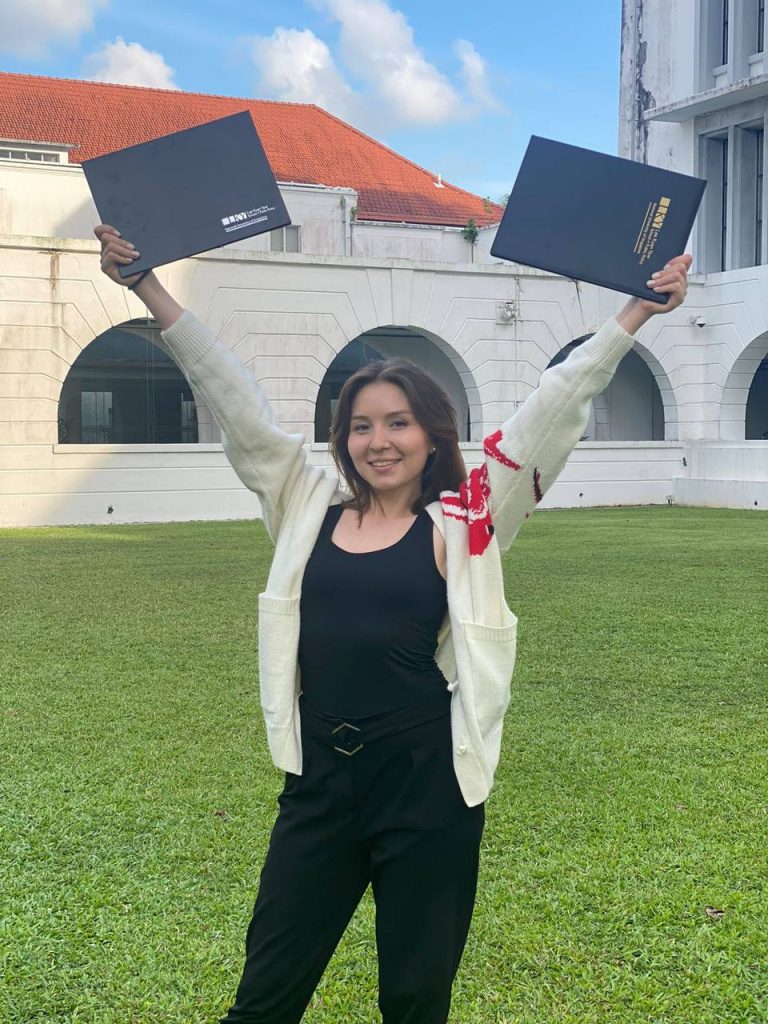 Dana Dana Abeldinova, 29 years old, UN Volunteer and MPA Graduate
Dana Dana Abeldinova, 29 years old, UN Volunteer and MPA Graduate
I am an employee of the UN Development Program in the administrative department and the Kazakhstan Association for Sexual, Reproductive, and Sexual Health in the city of Nur-Sultan.
About choosing a university
I chose medicine, but I didn’t want to be a doctor. I wanted to be a Public Health manager to contribute to improving the system. In this direction, I graduated from Astana Medical University (bachelor’s) and Al-Farabi Kazakh National University (Master’s).
At some point, I realized that I wanted to develop further. Then I heard from a friend about educational programs in the field of public administration.
About admission
I faced a challenge in choosing between the Graduate School of Public Policy and the Graduate School of Business. However, having weighed all the pros and cons of further development in both directions, I chose public policy. Moreover, NU GSPP had the opportunity to combine work and study, which was essential to me. I applied to the Graduate School of Public Policy of Nazarbayev University (NU GSPP) during the COVID-19 pandemic, and, fortunately, I gained admission with a state grant.
About the learning process
When I applied to NU GSPP, I thought it would be hard because this is a new chapter for me. However, most of the lectures took place online. Although this also has drawbacks, we could not communicate closely with professors. Only in the last semester were the classes held offline, and we could communicate face to face.
The program lasts two years. During the summer term, the School sent us to Singapore for two weeks; this part of the training is called the “Singapore Component.” To be qualified for the Singapore component, the student’s GPA must be at least 2.75.
About Singapore
The atmosphere at the National University of Singapore is wonderful. The university is located within the territory of the Botanic Garden. Students who study there rest on the lawn during breaks, and the older generation does qigong gymnastics and yoga in the morning there.
Being in Singapore, you understand that everything is well thought out and created for the individual and society there. For example, when construction is planned, they will first make a pedestrian corridor, and then construction work will begin. Singaporeans are also careful about water. Everywhere there are signs reminding us of the importance of saving water. If I ever go for a Ph.D., I will probably choose the topic of water because this is an important topic.
In Singapore, many things are planned 40-50 years ahead. If any projects are helpful for Singapore long term, they will be considered now. This approach is captivating.
It’s great that we got to know the Singaporean mentality! After all, this can help in working in international organizations, where representatives of other nationalities can be colleagues. For me, this is a significant advantage.
About the Singapore component
It was an intense two weeks with a hectic schedule: from morning to afternoon, we studied the theory of Singapore’s development, and then there was practical learning on the topic, and we went to particular locations. The organizers showed us how the city developed.
The lecturers have different backgrounds – some held top positions in the civil service, some headed key enterprises of the country. We also met representatives of startups in the so-called local Silicon Valley. They enthusiastically talked about how startups are developing in Singapore and why one should not be afraid to make mistakes in the general development of their startups.
The presentation of the material is excellent, plus the constant interaction between professionals encourages you to be active and do something extraordinary. I did not notice any shortcomings in the program.
About the program opportunities
Thanks to the program, I have broadened my horizons regarding my profession. I have identified additional development areas to become a highly qualified specialist. At NU GSPP, I gained the tools that have been already helping me reach my professional goals.
I recommend applying to this program for those who want to grow further, contribute to the country’s development, and think big. NU GSPP will help you grow.
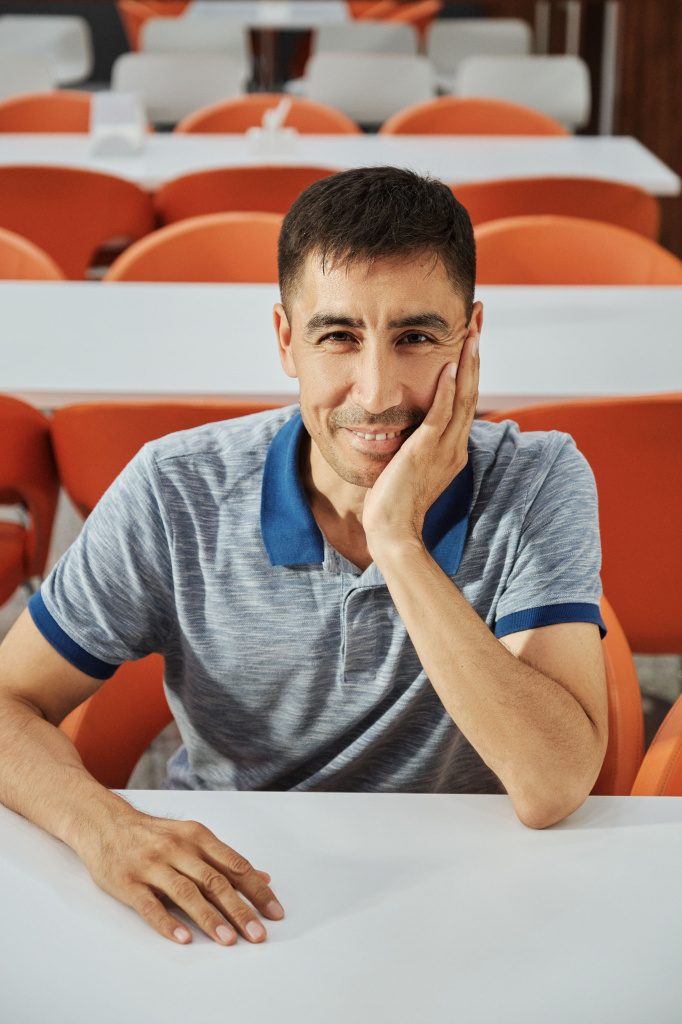 Abilkair Bolatbaev, 46 years old, civil servant and MPA graduate
Abilkair Bolatbaev, 46 years old, civil servant and MPA graduate
I am the head of the Department for the Development of New Technologies and Infrastructure in Communications of the Committee for Telecommunications of the Republic of Kazakhstan.
About choosing a university
When choosing a university, I considered several factors: whether the education is in English and whether the university has accreditation in Europe. Nazarbayev University was ideally suited for these points.
My advantage was that the learning process took place mainly online then because of the pandemic before resuming in-person later. We studied with professors from the UK, Australia, Singapore, and South Korea.
I am a civil servant, so I chose public administration. This is the field that I have to master.
About admission
For successful admission, it was necessary to submit documents, pass an interview, an English language test, and medical tests.
When applying, it is essential to know English well and clearly understand what you want from the university. I applied for the state grant.
About the features of training
Combining work and study was difficult because there is not enough down time in the public service. The core subjects were in the evening, but some electives were held during working hours. Participating in those classes were more difficult, but they were too interesting to miss.
About Singapore
We learned the history of Singapore starting from the 1970s. They showed how it was before and now, and even more important, how those changes have been implemented and how the country’s leadership acted. What Singapore has achieved is the result of the will of the country’s leadership and vision for many years. Much of what was planned was put in place there by a strong-willed method and an authoritarian style.
The Singapore component allowed us to listen to practitioners who work in government.
About the program opportunities
I got new knowledge and benefitted from networking.
Some graduates had business ideas and could test out how everything works on the spot.
I recommend applying to Nazarbayev University. You will not regret it.

